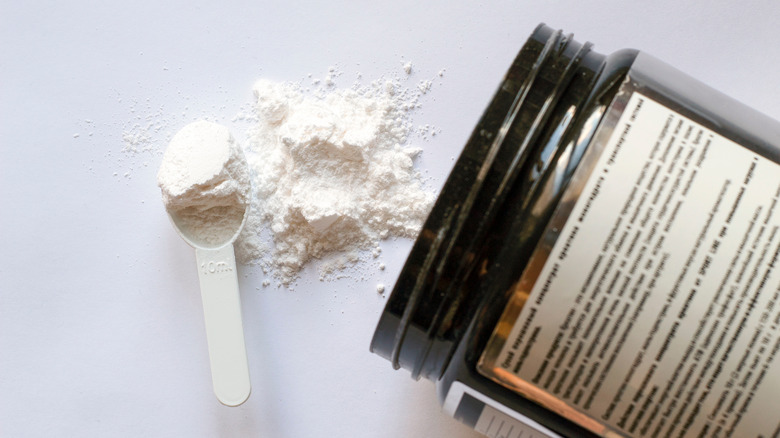What Happens To Your Body When You Take Creatine Every Day
If you've ever looked at workout supplements, you've probably noticed that creatine is a popular ingredient in many products. Here's what you should know about this supplement.
According to Healthline, creatine is naturally found in the cells of our muscles and helps them power through difficult tasks like exercise. It can also be found in the brain, kidneys, and liver, but that only accounts for about 5% of the total amount in our bodies. In addition to giving your muscles the energy to power through hard workouts, creatine has been shown to increase muscle mass by reducing protein breakdown. It can also improve muscle growth and speed up muscle recovery.
Creatine is a popular supplement for athletes, weightlifters, or anyone looking to grow muscle and improve their strength. It is agreed to be the "single most beneficial supplement for adding muscle mass" by a large review of workout and fitness supplements. Because creatine is also found in the brain, it has been shown to improve brain health and even prevent certain diseases in the brain.
Creatine is generally safe but shouldn't be used by everyone
Although the FDA has not approved creatine as a safe and effective supplement, it is considered generally safe to take when staying within the recommended dosage (via Medical News Today). A 2003 review mentioned by Medical News Today concluded that creatine "Appears to pose no serious health risks when taken at doses described in the literature and may enhance exercise performance in individuals that require maximal single effort and/or repetitive sprint bouts."
The long-term effects of creatine are not known, especially in adolescents. It is best taken by people who are healthy and eat a well-balanced diet. Side effects of creatine may include nausea, muscle cramps, diarrhea, and stomach pain. People with kidney disease or diabetes should avoid taking this supplement.
It's always a good idea to talk to your doctor before taking any new supplements. They will help you determine if this supplement is safe for you and what the best dosage is for your age and fitness goals.


